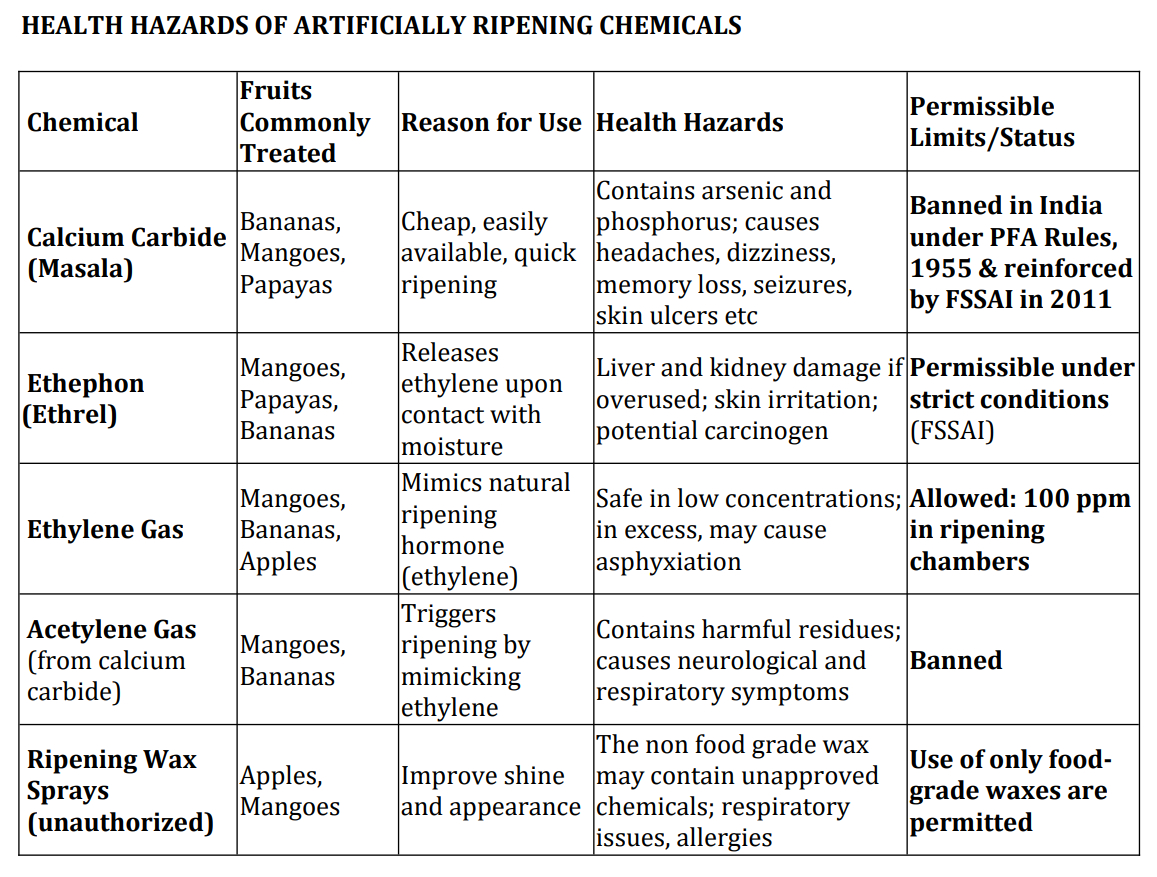In today’s world, people have to be ‘fruit smart’ to stay safe

PANAJI
In the bustling markets of Goa, where the sweet scent of mangoes fills the air and fruit stalls burst with colour, not everything is as wholesome as it seems.
Beneath the glossy skin of that perfect mango apple or banana may lie an unsettling truth – a fruit ripened not by nature, but by chemicals. That luscious mango may well be a ‘forbidden fruit’ – tempting on the outside, but potentially harmful within.
Welcome to the world of ‘artificial ripening’, where shortcuts to sweetness may come at the cost of safety. With the rising demand for perfectly ripe fruits all year round, some traders and unscrupulous vendors may turn to banned or restricted chemicals to ripen fruits faster, especially for bananas, mangoes, watermelons, papayas, and apples.
This practice, although illegal, persists despite the well-documented health hazards and pose a serious threat to consumers.
WHY ARTIFICIAL RIPENING
Fruit sellers often resort to artificial ripening to:
* Speed up the ripening process to meet market demand.
* Enhance the color and appeal of fruits.
* Extend shelf life for transport and sale.
HAZARDS OF ARTIFICIALLY RIPENED FRUITS
Neurological Disorders: Prolonged exposure to arsenic and phosphorus residues from calcium carbide can impair brain function. Calcium Carbide was banned by the PFA rules in 1955 and the ban was reinforced by FSSAI in 2011.
Respiratory Issues: Fumes from acetylene and non-food-grade waxes may lead to bronchitis or asthma.
Gastrointestinal Disturbances: Ingesting chemically ripened fruits may lead to nausea, vomiting, diarrhoea, and abdominal pain.
Carcinogenic Risks: Some chemicals like Ethephon may break down into harmful compounds like ethylene oxide, a known carcinogen that can lead to cancer.
Liver and Kidney Damage: Chronic exposure to certain chemicals can burden the detoxification organs like the liver and kidneys.
People who use these banned products may not even know about the harm they can cause to the ones who consume the artificially ripened fruits. In fact, chemicals like Calcium carbide are also harmful to the vendors who use it.
WHAT SHOULD CONSUMERS DO
Consumers are advised to be ‘fruit smart’- here is an interesting way to remember what you need to do.
F: Feel the texture. Artificially ripened fruits may be too soft or too firm in odd places.
R: Rinse thoroughly. Washing fruits well can reduce surface chemical residues.
U: Understand labels. Check for certification or ripening details on packaged fruits
I: Inspect for uniformity. Overly uniform colour may indicate chemical ripening.
T: Trust your nose. Naturally ripened fruits have a pleasant, natural aroma.
S: Say no to street shine. Avoid unnaturally glossy or waxy fruits
SAFE RIPENING PRACTICES
Use of Ethylene Gas Chambers: It mimics natural ripening and is safe within prescribed limits.
Temperature and Humidity Control: Ensures uniform and controlled ripening without chemicals.
Certification and Monitoring: Vendors should procure fruits from certified ripening chambers.
THE FINAL BITE
While artificial ripening has commercial advantages, the indiscriminate use of harmful chemicals like calcium carbide poses significant health risks. Authorities like the Goa FDA are cracking down on illegal practices, but consumer vigilance and vendor education are equally important. Using regulated methods like ethylene gas ripening in controlled chambers ensures fruit safety and public health.
(The writer is a senior faculty at the Department of Preventive and Social Medicine at the Goa Medical College and has been involved in raising awareness on various public health issues in Goa for over two decades)